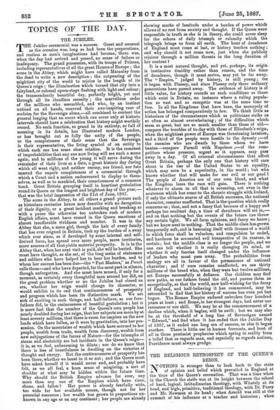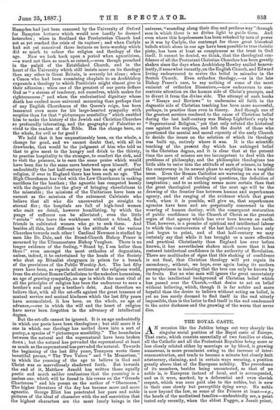THE RELIGIOUS RETROSPECT OF THE QUEEN'S REIGN.
NOTHING is stranger than to look back to the state of opinion and belief which prevailed in England at the time of the Queen's coronation. That was a time when in the Church the strife was at its height between the school of hard, logical, latitudinarian theology, with Whately at its head, and high, primitive, traditional theology, with Dr. Pusey and Mr. Newman at its head ; when Arnold was still at the summit of his influence as a teacher and historian ; when
Hampden had just been censured by the University of Oxford for Bampton lectures which would now hardly be deemed heterodox ; when in Scotland the Presbyterian Church had not as yet reached the crisis of its rupture ; and when Carlyle had not yet conceived those lectures on hero-worship which did so much to colour the religion and theology of the age. Now we look back upon a period when agnosticism, —a word not then so much as coined,—even though preached in the • pulpit of the Established Church, and in the heart of the University which still insists more on its theology than any other in Great Britain, is severely let alone ; when a Canon who had been examining chaplain to an Archbishop expounds a theology to which Positivists might almost give in their adhesion ; when one of the greatest of our poets defines God as " a stream of tendency, not ourselves, which makes for righteousness ;" and when the ecclesiastical dignitary whose death has excited more universal mourning than perhaps that of any English Churchman of the Queen's reign, has been lamented even snore for his large-hearted sympathy with sceptics than for that "picturesque sensibility" which enabled him to make the history of the Jewish and Christian Churches so profoundly interesting, and the geography of Palestine so vivid to the readers of the Bible. Has the change been, on the whole, for evil or for good ?
We hold that it has unquestionably been, on the whole, a change for good, and we cannot doubt that, with all its drawbacks, that would be the judgment of him who told us that to give meat to the hungry and drink to the thirsty, to practise hospitality to the stranger, to comfort the sick, and to visit the prisoner, is to earn the same praise which would have been due to the same cares bestowed upon himself. For undoubtedly the last half-century has been an age of practical religion, if ever in England there has been such an age. The High Churchman has vied with the Low Churchman in making sacrifices for the heathen ; the agnostic has competed keenly with the dogmatist for the glory of bringing cheerfulness to the miserable ; the missions of the Unitarians have been as earnest as the missions of the extremest Calvinists who believe that all who die unconverted go straight to eternal firs; the hospitals are full of high-bred women who omit no detail, however humiliating, by which the pangs of sufferers can be alleviated ; even the little " scrubs " who leave the workhouse without a friend, find friends in cultivated women who go to seek them. And besides all this, how different is the attitude of the various Churches towards each other Cardinal Newman is studied by men like Dr. Dale, and the Broad-Church Bishop Fraser is mourned by the Ultramontane Bishop Vaughan. There is no longer evidence of the feeling, "Stand by, I am holier than thou!" even amongst the most orthodox of dogmatists, unless, indeed, it be entertained by the heads of the Society who shut up Ritaaliet clergymen in prison for a breach of the provisions of the Public Worship Act. The last fifty years have been, as regards all sections of the religious world, from the strictest RomanCatholicism to the nakedest humanism, an age of growing sympathy, an age in which the most vital of all the principles of religion has been the endeavour to save a brother's soul and pay a brother's debt. And therefore we believe that, with all the set-offs against the great treasure of mutual service and mutual kindness which the last fifty years have accumulated, it has been, on the whole, an age of advance,—one in which the will and the heart of religion have never been forgotten in the advocacy of intellectual dogma.
But the set-offs cannot be ignored. It is an age undoubtedly in which our poets have been theologians ; but still more it is one in which our theology has melted down into a sort of poetry, a species of "picturesque sensibility." The boundaries between the natural and the supernatural have been broken down ; but the natural has pervaded the supernatural at least as much as the supernatural has pervaded the natural. Towards the beginning of the last fifty years, Tennyson wrote those beautiful poems, " The Two Voices" and "In Memoriam," in which the yearning of the age to believe in God and Christ was so marvellously shadowed forth. But towards the end of it, Matthew Arnold has written those equally poetic and much sadder confessions that the yearning is a useless one, which will be found in his verses on the "Grande Chartreuse" and his poems on the author of " Obermann." The higher literature of the day has become more and more agnostic. George Eliot has penetrated her pure and noble pictures of the ideal of character with the sad conviction that the highest characters are the most lonely beings in the
universe, "sounding along their dim and perilous way "through seas in which there is no divine light to guide them. And even where this hopelessness has been rebuked by men of power as it was by Carlyle, the contempt for those great historical beliefs which alone in our age have been possible to true theistic piety, has been at least as conspicuous as the trust in God itself. It cannot be denied, Nact think, that the theological con- fidence of all the Protestant Christian Churches has been greatly shaken since the days when Archbishop Howley smiled benevo- lently, if somewhat vacantly, on the English Church, and Edward Irving endeavoured to revive the belief in miracles in the Scotch Church. Even orthodox theology,—as in the late Bishop Fraser's case, to say nothing of some of the most eminent of orthodox Dissenters,—now endeavours to con- centrate attention on the human side of Christ's precepts, and to divert it from the divine side. The attempt of such books as "Essays and Reviews" to undermine all faith in the dogmatic side of Christian teaching has been more successful, perhaps, in practice than even in theory. And though one of the greatest services rendered to the cause of Christian belief during the last half-century was Bishop Lightfoot's reply to "Supernatural Religion," yet that only refuted the historical case against the sceptics, and left the doubt of those who questioned the mental and moral capacity of the early Church to decide the issues on the solution of which its theology was built up, entirely where it was. It is the scientific teaching of the present day which has unhinged belief in the Christian dogma, and it is clear that at the present time the men of science are too incompetent to deal with the problems of philosophy, and the philosophic theologians too. little able to enter into the attitude of men of science, to bring the controversy in its newest phase to anything like a tangible issue. Even the Roman Catholics are wavering on one of the most important of all theological questions, the definition of inspiration ; and to us nothing seems more certain than that the great theological problem of the next age will be the drawing of the frontier line between human and superhuman agency, and the ranging of the evidence which that great work, when it is possible, will give us, that superhuman agencies have been and are •perpetually concerned in the weaving of human destiny, with the consequent restoratioa of public confidence in the Church of Christ as the greatest organ of that agency which has ever been known on earth. That, however, is a promise of spiritual and intellectual labour to which the controversies of the last half-century have only just begun to point, and of that half-century we may certainly say that while it has brought us a more effective and practical Christianity than England has ever before known, it has nevertheless shaken much more than it has restored intellectual confidence in the authority of Revelation. There are multitudes of signs that this shaking of confidence is not final, that Christian theology will yet regain its ascendency, without, we hope, ever again losing its modern peremptoriness in insisting that the tree can only be known by its fruits. But no wise man will ignore the great uncertainty as to the intellectual background of Christian belief which has passed over the Church,—that desire to act on belief without believing, which, though it is far nobler and more hopeful than the desire to believe without acting on belief, is yet no less surely doomed to find itself in the end utterly impossible, than is the latter to find itself in the end condemned to the outer darkness and the gnawing of the worm that never dies.



































 Previous page
Previous page